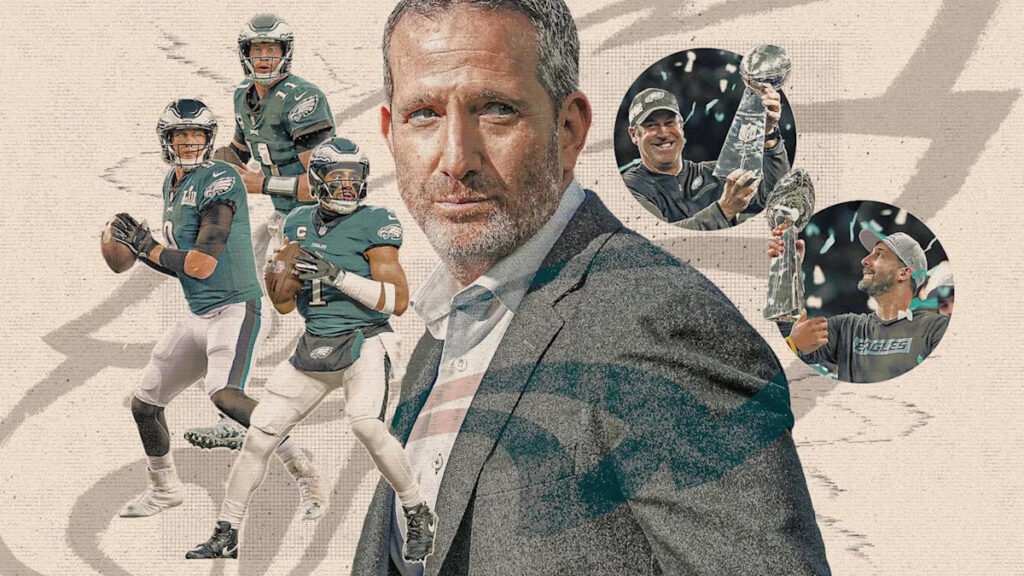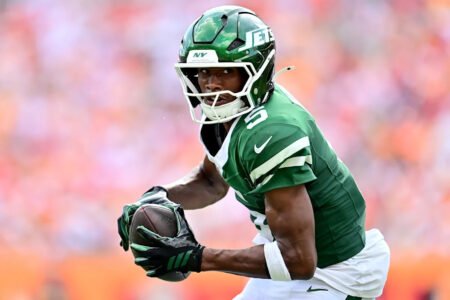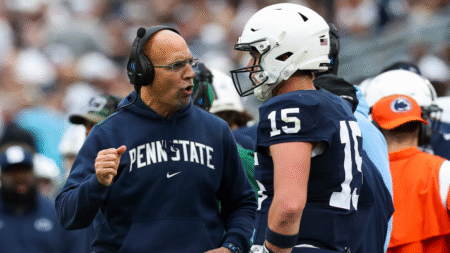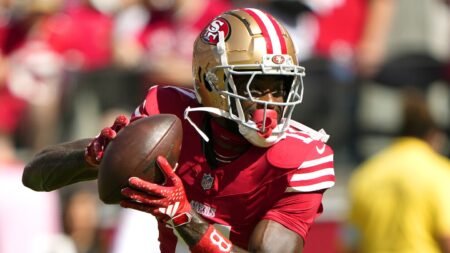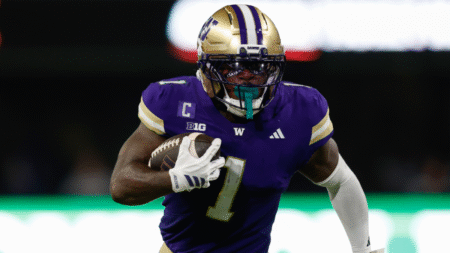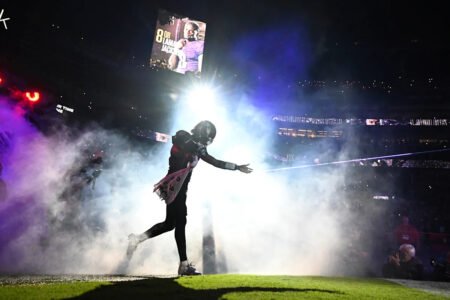More 25 in 2025: Trends shaping the NFL | Game changers to watch | Jones, Kraft and Goodell succession plans | Shanahan tree’s evolution | Rex Ryan’s influence | Incorporating Michael Vick | Legion of Boom phenomenon | Onboarding Jayden Daniels
PHILADELPHIA — As the 53-man roster deadline neared in August, the Eagles began dealing.
Advertisement
General manager Howie Roseman was at it again.
League executives had noticed the club quietly amassing a draft haul that positioned the Eagles for 13 selections in the 2026 NFL Draft.
But while the defending Super Bowl champions were coming off a string of strong drafts, counterparts and colleagues knew better to assume any asset within Roseman’s reach resembled its final form.
So the Eagles swapped a tight end and a fifth-round pick for a receiver and a sixth on Aug. 18. Six days later, they agreed to acquire quarterback Sam Howell and a sixth as they sent the Minnesota Vikings a fifth and 2027 seventh.
Advertisement
The Jacksonville Jaguars and Green Bay Packers would enter the mix next, the Eagles engaging each in a pick-for-player trade as the Eagles tweaked their offensive line room.
“I don’t sit here, no matter what the year is, no matter what the time of the year is, and feel content with what we’re doing,” Roseman said. “I’m the first one to admit we will make some mistakes. But I promise you we’re going to keep shooting.
“We’re going to do our best to put together the best team that we possibly can.”
[Join or create a Yahoo Fantasy Football league for the 2025 NFL season]
When the Eagles kick off their attempt at a Super Bowl title defense Thursday, Day 3 draft picks and depth players are unlikely to generate significant air time.
Advertisement
Bigger-name trade acquisitions like Saquon Barkley and A.J. Brown will headline the Eagles while the Dallas Cowboys team Philadelphia hosts will be discussed first and foremost for trading star edge rusher Micah Parsons to the Green Bay Packers last Thursday.
But don’t underestimate what the Eagles’ sly move might mean for their season.
Because a decade after Roseman lost a roster-control power battle with then-head coach Chip Kelly and spent a year away from general manager duties, Roseman has channeled a fearless aggressiveness to pivot and evolve into a résumé that counterparts expect will land him in Canton.
Fellow general managers take note of his fearless risk-taking with admiration and hints of jealousy, several told Yahoo Sports. Some wish they had reached a stage in their career where they had earned the trust to deal as liberally as Roseman does; others think wistfully of a time when they can move off the contracts of players no longer serving them in a way that Roseman once shed the Eagles’ obligations to quarterback Carson Wentz.
Advertisement
“The Eagles are always trying to gain an edge,” Los Angeles Rams general manager Les Snead told Yahoo Sports. “You can feel and see them trying.”
Nominations for Yahoo Sports’ 25 Game Changers in 2025 considered: Who will influence the NFL in ways that force opponents to respond? Who will make their mark on the league in a manner that others will desire to emulate?
Roseman’s influence spans from his aggressive dealmaking and hyperactive pick-swapping to his mastery of the compensatory draft pick system and creation of a culture that extends stars before negotiations become unruly.
Competitive drive is not only a mantra for Roseman — it is a lived ethos.
General manager Howie Roseman and running back Saquon Barkley bask in Super Bowl glory after Philadelphia’s demolition of Kansas City in February. (Cindy Ord/Getty Images)
(Cindy Ord via Getty Images)
As Roseman and the Eagles look to defend their latest title, all of these strategies will shape not only their own franchise’s future but also the future of opponents angling to catch up. What a drastic swing from a decade ago, when Roseman was demoted from general manager and serving a year that many around the league refer to as his exile.
Advertisement
Since he returned, Roseman has collected two titles and three total Super Bowl appearances in eight years.
And while no team sport is won by a single actor, Roseman has now hoisted Lombardi trophies with different head coaches and different quarterbacks. He is the constant.
“That whole year, I wasn’t planning to come back with the Philadelphia Eagles; I was thinking that I was going to have to reinvent myself somewhere else,” Roseman said in February, days before the Super Bowl. “That’s what drives me: knowing how quickly in this business you go from being really successful to getting your ass kicked.
“I wanted to do it differently if I ever got a shot again.”
Advertisement
‘If you’re following some other trend, you’re on the back end of it’
Remind the Eagles’ 50-year-old general manager that he’s now spent a full half of his life working for the club and you may evoke a trademark “Oh, boy,” from him.
Roseman first interned with the Eagles in 2000, working his way up to salary cap staff counsel then director of football administration and eventually vice president of football administration. By 2008, Roseman oversaw the Eagles’ college scouts and draft process. His first general manager term began in 2010.
The rotation-like exposure created the foundation for an interdisciplinary approach.
Advertisement
“It’s that blend of experiences that allows him to be such an effective executive because it’s not like he’s someone who’s only negotiating contracts or only scouting, and then essentially has to completely rely on someone else to do the other aspects of the job,” Brown general manager Andrew Berry told Yahoo Sports. “He understands how they intersect. And that allows him to make richer, deeper, more intelligent and more creative decisions.”
Many of Roseman’s current philosophies stem from the early years, when Andy Reid was the Eagles’ head coach with roster control from 2001 through 2012. In Reid’s official time as general manager, and in his years when his titles included head coach and executive vice president of football operations, the now-Kansas City Chiefs head coach taught Roseman: invest in what travels.
Those years deeply influenced the Eagles’ commitments to the offensive and defensive lines, trench play among the top reasons Philadelphia thumped its former coach and the Chiefs in the latest Super Bowl. Reid emphasized also in those years the immense premium that should be placed on quarterback. The philosophy sounds obvious, but its application varies wildly from team to team. The Eagles committed then, as they continue to commit now, not only to investing resources to shore up their starting quarterback but also to searching tirelessly for the best backup available.
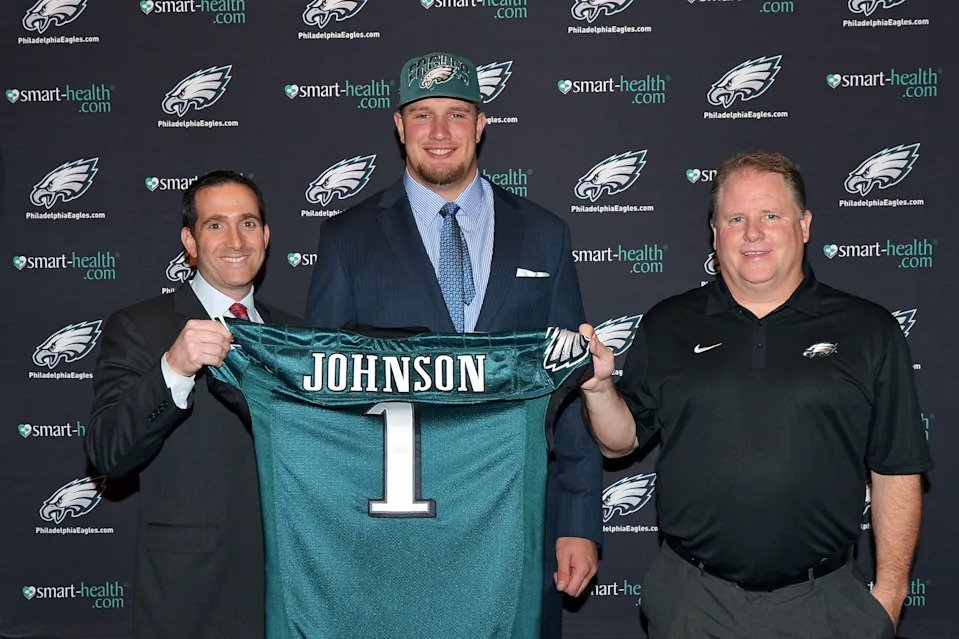
Howie Roseman, pictured in 2013 with Eagles head coach Chip Kelly and first-round draft pick Lane Johnson. (Photo by Drew Hallowell/Philadelphia Eagles/Getty Images)
(Drew Hallowell via Getty Images)
Roseman traded for former Pittsburgh Steelers starter Kenny Pickett last spring and for the former Washington Commanders starter in Howell last week. He desires experience from his No. 2 quarterback and allocates resources accordingly.
Advertisement
“We just thought it was an opportunity to improve in the short-term the quarterback position, which is obviously a hugely important position …” Roseman told reporters after the roster-cut deadline. “Trying to figure out where we can get away with developing some guys that we think can help us in the future and where we can help the team in the short term and make sure that we are covered.”
While the Eagles have long prioritized quarterback, cornerback, offensive line and defensive line within a parity-designed league model that demands sacrifices in some areas on the roster, Roseman has added a premium position to his top-choice investments: Pro Bowl-caliber skill players.
Bolstering the lines of scrimmage is still necessary but no longer sufficient to win a game that increasingly resembles basketball on grass, Roseman believes. So Roseman traded the 18th and 101st picks of the 2022 NFL Draft for Brown. And when he saw the running back market devalued to the point of opportunity last offseason, he signed free-agent running back Barkley — who would go on to rush for more than 2,000 yards.
Sacrifices would follow, including the loss of defensive linemen Milton Williams and Josh Sweat this spring in free agency. But Roseman didn’t regret how he’d allocated his salary cap space.
Advertisement
“If you’re following some other trend, you’re on the back end of it,” Roseman told Yahoo Sports. “And so you’re not getting the benefit of that. So sometimes you have to proactively do things that maybe are outside the box because that’s the value at the time.”
From big-name QBs to special teamers, Roseman continues to deal
The lessons Roseman learned in 2015 came at a time when he was well-positioned to internalize them.
How better to stop fearing mistakes than to experience one of the worst-case professional scenarios a mistake could cause?
“When I came back, I was already kind of fired once, so I wasn’t really worried about losing my job anymore,” Roseman said in February. “That gives you kind of a freedom to do things that you think are right without worrying about the ramifications.”
Advertisement
Roseman felt free to select quarterback Jalen Hurts in the second round of the 2020 NFL Draft less than a year after extending Wentz. He felt free also to trade Wentz to the Indianapolis Colts in 2021, ultimately netting a first- and a third-round pick.
Bigger-name pivots have come to define Roseman’s reputation. But his commitment to similar lower-profile moves at times may be the difference between winning more games and winning it all.
Travel back to November 2019, when the Eagles waived safety Andrew Sendejo less than eight months after signing him. Sendejo was well-liked in the locker room, contributing 41% of defensive snaps as well as 68% of special teams snaps. Roseman didn’t dislike the safety’s performance. But determined to exploit every edge, the general manager realized releasing Sendejo would set the Eagles up for a compensatory pick. So the Eagles released Sendejo, claimed safety Marcus Epps off waivers, and emerged from the shuffle with the same safety depth but one more fourth-round pick than keeping Sendejo would have allowed. (Roseman would trade that fourth-rounder, too, for two fifth-round picks that were traded still further, and on it went.)
“It’s a tough decision at the time because in season, nobody wants to hear about that,” says Berry, who spent 2019 with the Eagles as vice president of football operations. “But that resource was much more important than maybe the 200 snaps we would’ve received from the player in a rotational capacity for the rest of the season.
Advertisement
“Even something as small as that wasn’t too small for him to consider to make sure that we had the right advantages for the team.”
Roseman feels similarly about Day 3 draft trades, loving the message they send that every roster spot and every resource to fill it matters. How can he ask his players and coaches to commit to greatness on little details if he doesn’t? His goal isn’t to always seek spectacular and flashy and rare-to-find, rarer-to-pull off moves. Saquon Barkleys don’t come across the market often. Instead, the Eagles strive to outwork and outwit their opponents daily.
“We want to do ordinary better than anybody else,” head coach Nick Sirianni told the team this training camp, “because those are the things that end up winning football games.”
So Roseman will keep trading players and picks, and he’ll keep investing in the positions he believes are non-negotiable to win it all. He’ll keep viewing every resource as a means to an end, and he’ll keep surrounding himself with a deep and talented front office that supports and elevates all of these pursuits in a way some executives don’t.
“Some people, they may be insecure about surrounding themselves with people that have an aggressive mindset,” said Joe Douglas, who has rejoined the Eagles after his stint as New York Jets general manager. “He wants to surround himself with as many good people as he can, in any way, shape or form.”
Advertisement
He reminds those colleagues the necessity of humility coming off a title season. Arrogance will lose them games quickly, Roseman believes. Misplaced contentment will dull the Eagles’ edge.
“I don’t think that we’re done,” Roseman told reporters after the roster-cut deadline. “This is a work in progress.”
Sirianni chimed in: “Not giving me the keys quite yet.”
“Not yet,” Roseman agreed. “Not yet. He’s going to drive. But we’re going to continue sitting together.”
“I think that’s where we have to be.”
Read the full article here





